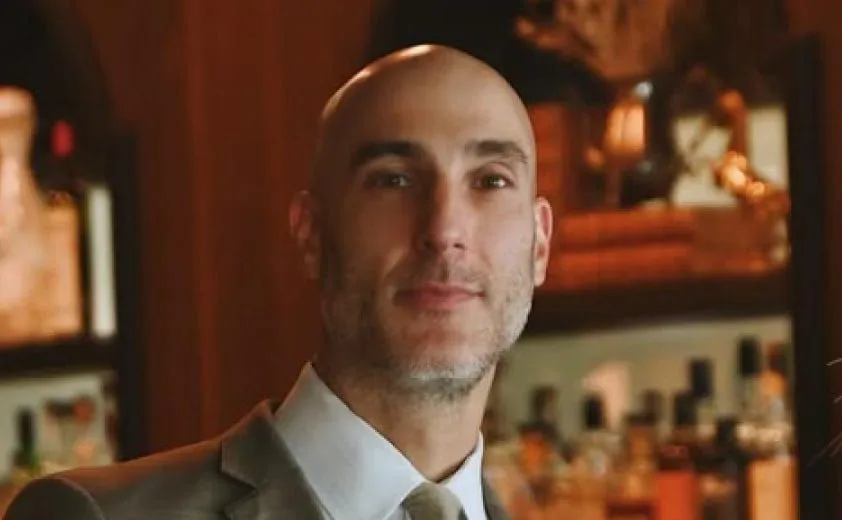Getting career advice from professionals with over 30 years of experience just hits differently. OysterLink is on a mission to connect ambitious hospitality talent with top-tier mentors.
In today’s interview, we sat down with Oren Cohen, the General Manager at Life House. We talked about the importance of mentorship, who can be a great mentor and how young professionals can secure a great mentorship.
How can we inspire Gen Z to join the hospitality industry?
Oren: More than ever, people are looking for purpose in their work. And in hospitality, we have an incredible opportunity to show that it’s cool to care.
Today, there's so much focus on self that people can be hesitant to invest in others. But in my experience, the individuals who truly embrace the culture of hosting and hospitality—rather than just working for a paycheck—find far more fulfilment in what they do.
When you see this industry as more than just a job, it changes everything. It’s not just about serving guests; it’s about being part of their experiences.
The best employees aren’t just filling orders—they’re creating memories, celebrating milestones, and turning strangers into friends. That kind of engagement isn’t just rewarding for the guests; it makes the work itself deeply satisfying.
One of the simplest ways to shift perspective? Set small, meaningful goals. I challenge my team to leave each shift having learned five new names. It’s not much, but it makes a difference. When they start recognizing themselves as more than just servers or bartenders—as people who are seen and valued—their connection to the job deepens.
At the end of the day, hospitality isn’t just about providing a service. It’s about human connection. And the best part? That level of care costs nothing—but it changes everything.
What is the best way to attract & hire qualified candidates?
Oren: I think one of the key components to hiring and retaining talent is providing a healthy, supportive, and positive work environment. It's not just about hiring—it’s about retaining top talent.
A workplace should nurture and accelerate employees’ skills rather than restrict them. I've been in this industry long enough to see environments where employees are discouraged from engaging, simply following a routine: drop the menu, take the order, deliver the check, and expect a tip. That kind of system limits both job satisfaction and service quality.
It all starts with leadership. Owners and managers set the tone for the entire workplace. This includes:
- Providing proper resources—ensuring staff have the tools they need to succeed.
- Maintaining the property—a well-kept space signals professionalism.
- Creating a strong atmosphere—elements like music and lighting can make an impact.
When we invest in memorable atmospheres, we encourage employees to take initiative and create exceptional guest experiences.
Motivation and inspiration also play a huge role. Leadership should set the tone by presenting themselves as role models. This starts from the very first interview—how a candidate chooses to engage tells you a lot.
For example, I prioritize candidates who go the extra mile, such as dropping off their resumes in person instead of just sending emails. When someone walks in and says:
"I don’t know if you're hiring, but I love this place. I've done my research, and I’d love to find an opportunity here."
That level of initiative and enthusiasm is what truly sets great candidates apart.
When is the right time to discuss career goals with your manager?
Oren: That's a great question. When you're in a managerial position, you understand that management isn't something you wake up to—it’s something you earn through hard work and experience. Because of this, managers recognize the value of discussing career goals early on, even as early as the first interview. Being able to articulate your goals and aspirations is an important conversation to have from the start.
A career discussion is a two-way street. While it’s a manager’s responsibility to listen and provide opportunities, it’s also up to the employee to take the initiative. Employees should express what excites them, what skills they’d like to develop, and where they see themselves growing. For example, someone might say, “I’ve always been intimidated by bartending, but I’d love to learn.” A good employer will acknowledge this and create opportunities while also assessing the skills required to reach that goal.
Transparency and realistic expectations are key.
If an introvert expresses interest in bartending, a manager should set clear expectations about the role’s social nature. Open communication helps ensure the right career path is chosen and that steps toward achieving goals are manageable and well-supported.
Instead of overwhelming an employee with too much information or expecting them to learn everything overnight, it’s better to break goals into small, achievable steps. For instance, if someone wants to become a bartender, they could start by mastering the basics—pouring wine and beer—before moving on to crafting simple cocktails and eventually learning complex recipes. Building a solid foundation, step by step, is essential for success.
Some employees will naturally excel, while others might struggle. It’s important to offer encouragement, motivation, and constructive feedback without jeopardizing the quality of service. Managers should strive to foster enthusiasm while maintaining high standards. Constructive feedback is a crucial part of the process, as it helps employees refine their skills and stay on track toward their goals.
Ultimately, it takes a lot for a manager to give up on someone, especially if they’ve expressed a genuine desire to grow. Expressing career aspirations takes courage, and when employees do so, they deserve support and guidance in reaching their full potential.
What are the three biggest job seeker red flags?
Oren: I am not sure I ever thought about it that way, but if I had to group them, I would have to say:
- Arrogance and entitlement
A major red flag is when candidates act as if it’s a privilege for others to be around them. This attitude, especially in hospitality, creates a disconnect with guests and colleagues. For example, a bartender presenting a cocktail with an air of superiority rather than engaging with the guest to ensure they enjoy the drink is a concerning trait. Hospitality thrives on humility and genuine service.
- Know-it-all mentality
Candidates who believe they have nothing left to learn often struggle in team environments. If someone insists, they’ve mastered everything, it raises the question: why are they even applying? Often, such individuals have been dismissed from multiple roles due to their unwillingness to grow and adapt. The best professionals recognize that learning is ongoing.
- Poor teamwork and body language
A candidate’s demeanour speaks volumes. Closed-off body language, unwillingness to collaborate, and a lack of adaptability can hinder team dynamics. Hospitality is a team effort—from the dishwasher to the maître d'—and success depends on cooperation. If arrogance prevents someone from asking for help or supporting others, it will eventually hold them back.
The saying goes: If you want to go fast, go alone. If you want to go far, go with a team. That philosophy is at the heart of hospitality.
What is the one question candidates should prepare an answer for?
Oren: That's a fun question. Over the years, I think what I've come to realize is that everyone has their own approach to interviewing and what they prioritize. For me, I focus on bringing real, human, and emotionally intelligent people into our space.
A fundamental question I ask when meeting a stranger is: "What do you do in your time outside of work? What else drives you?" Work is a component of life, but it is not your entire life. It’s very telling when I meet someone who has vision beyond their job and invests in themselves—whether through personal health, fitness, community engagement, or hobbies.
I need to know that candidates are refilling their cup because when they come into work, they are giving their energy to others. If they are not replenishing themselves outside of work, they will eventually burn out. Employees who take good care of themselves can sustain their performance and contribute positively to the team.
A lack of balance often leads to resentment and hostility, which can surface over time. If someone needs to end every day with an empty glass of whiskey just to cope, their longevity in the industry is questionable. I understand that shift drinks are standard in the industry, but I have eliminated many of these outdated norms in my programs to create more success for my personnel. I don’t need to buy their favor with complimentary drinks. Instead, I focus on meaningful recognition and fostering a sense of camaraderie through achievements and milestones.
Recognition should feel special, not routine. By celebrating accomplishments appropriately, employees feel valued and motivated. Unfortunately, there aren’t enough mentors and leaders who prioritize employee mental health and well-being as much as guest experience. If your employees are unhappy, it’s nearly impossible to have happy guests.
I invest a lot in my personnel, but I expect the same from them. Punctuality, professionalism, and attention to detail are fundamental. Employees need to be presentable and aware that they are in a service and sales role. Even small details, like well-groomed nails and neat uniforms, matter in this industry.
Ultimately, I look for candidates who understand that work is part of a larger, balanced life. Those who take care of themselves are more likely to succeed and contribute meaningfully to our team.
How can one build a lasting career in hospitality?
Oren: Longevity in hospitality isn’t just about showing up—it’s about engaging, connecting, and making the job fulfilling. The key? Treat every shift like an opportunity to build relationships.
Make Every Interaction Count
Instead of just serving drinks and moving on, take a real interest in your guests. A simple trick? Learn and remember five names a day. Over time, you build a network of regulars who support you year after year. With social media, these connections can last a lifetime.
Invest in the Guest, and They’ll Invest in You
When serving a couple celebrating an anniversary, go beyond just pouring champagne—ask how they met, what keeps them smiling after ten years. These small moments create loyalty, turning guests into long-term supporters. The more you engage, the more fulfilling the job becomes.
See the Bigger Picture
Much like fitness, where progress is built over time, hospitality success is about consistent small efforts. Each shift, each interaction, each new guest adds up to a rewarding career.
Reframe Your Perspective on Work
Some of the most rewarding shifts—both emotionally and financially—can be on your birthday. Instead of taking the day off, celebrate with the guests who always celebrate with you. When you’ve built strong relationships, they’ll want to give back—sometimes in ways you’d never expect.
Longevity in hospitality comes down to engagement. Build relationships, invest in your guests, and find joy in the connections you make. Do that, and you won’t just last in the industry—you’ll thrive.
What is a realistic timeline for building a hospitality career?
Oren: Building a hospitality career doesn’t always follow a set path—it can develop organically based on experiences and opportunities. Many professionals start with part-time or casual roles, such as catering events, banquet service, or waiting tables while pursuing other studies or careers.
For some, this initial exposure leads to a deeper interest in the industry. Over time, they begin to see hospitality as a long-term career rather than just a side job. This transition often happens when individuals recognize the professionalism, skill, and dedication that full-time hospitality workers bring to the industry.
A realistic timeline can look like this:
- Entry-level experience (0-2 years): Many start in casual or part-time roles, often while studying or working in another field. These positions help develop essential skills in customer service, teamwork, and operations.
- Full-time transition (2-5 years): Those who decide to commit to hospitality often move into more stable, full-time roles, possibly in hotels, restaurants, or catering companies. During this time, they may seek additional training or mentorship.
- Career growth & specialization (5-10 years): Professionals may start moving into supervisory roles, working at reputable establishments, and networking within the industry. Many refine their skills and explore areas such as hotel management, fine dining, or event planning.
- Leadership & expertise (10+ years): With experience, many professionals step into management, executive roles, or even entrepreneurship, opening their own hospitality businesses or taking on high-level positions in major hotels and restaurants.
Ultimately, hospitality careers are shaped by a mix of opportunity, passion, and persistence. Whether through formal education or hands-on experience, success comes from continuously learning, seizing opportunities, and committing to excellent service.
What is the one thing you wish you knew before joining the hospitality industry?
Oren: One thing I wish I knew before joining hospitality is that attitude is everything.
This industry is essentially a sales role—you're selling an experience, not just serving food.
Your success depends on understanding that every interaction is an opportunity to create value, increase sales, and enhance guest experience. The best hospitality professionals master sales techniques, build rapport, and turn meals into memorable moments. Those who embrace this mindset will earn more, gain loyal customers, and thrive in the industry.
Turning Passion Into a Hospitality Career: Next Steps for Gen Z Job Seekers
A lasting career in hospitality starts with engagement, learning, and building meaningful relationships. Whether you're just starting out or looking to grow, the key is to stay proactive—seek mentorship, take on challenges, and immerse yourself in the culture of service.
If you’re ready to take the next step, explore top hospitality job openings or check out our guides on how to stand out in hospitality interviews. The industry rewards those who show up with passion—so take the initiative and start building your career today!







Loading comments...